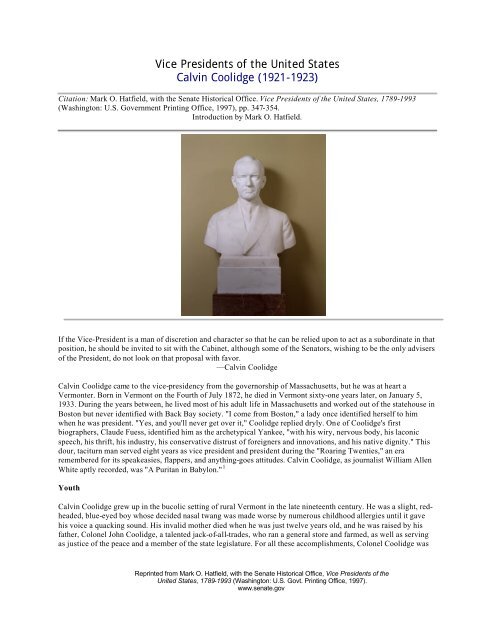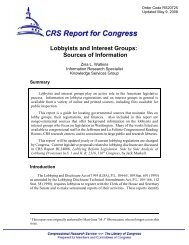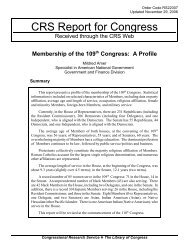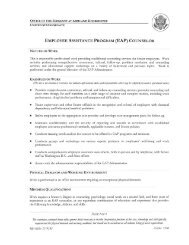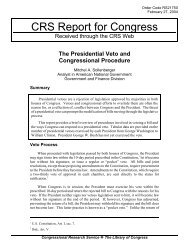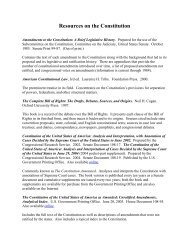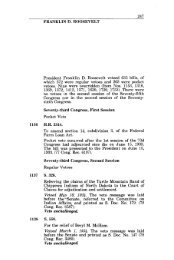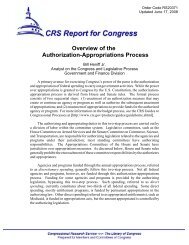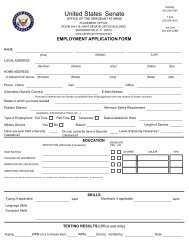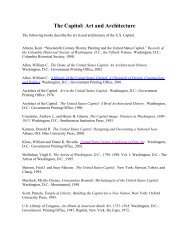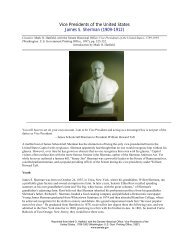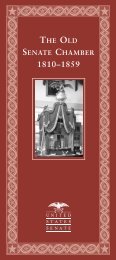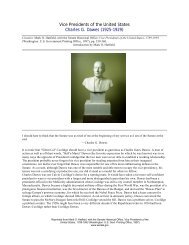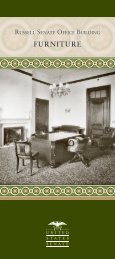Vice Presidents of the United States Calvin Coolidge ... - U.S. Senate
Vice Presidents of the United States Calvin Coolidge ... - U.S. Senate
Vice Presidents of the United States Calvin Coolidge ... - U.S. Senate
You also want an ePaper? Increase the reach of your titles
YUMPU automatically turns print PDFs into web optimized ePapers that Google loves.
<strong>Vice</strong> <strong>Presidents</strong> <strong>of</strong> <strong>the</strong> <strong>United</strong> <strong>States</strong><br />
<strong>Calvin</strong> <strong>Coolidge</strong> (1921-1923)<br />
Citation: Mark O. Hatfield, with <strong>the</strong> <strong>Senate</strong> Historical Office. <strong>Vice</strong> <strong>Presidents</strong> <strong>of</strong> <strong>the</strong> <strong>United</strong> <strong>States</strong>, 1789-1993<br />
(Washington: U.S. Government Printing Office, 1997), pp. 347-354.<br />
Introduction by Mark O. Hatfield.<br />
If <strong>the</strong> <strong>Vice</strong>-President is a man <strong>of</strong> discretion and character so that he can be relied upon to act as a subordinate in that<br />
position, he should be invited to sit with <strong>the</strong> Cabinet, although some <strong>of</strong> <strong>the</strong> Senators, wishing to be <strong>the</strong> only advisers<br />
<strong>of</strong> <strong>the</strong> President, do not look on that proposal with favor.<br />
—<strong>Calvin</strong> <strong>Coolidge</strong><br />
<strong>Calvin</strong> <strong>Coolidge</strong> came to <strong>the</strong> vice-presidency from <strong>the</strong> governorship <strong>of</strong> Massachusetts, but he was at heart a<br />
Vermonter. Born in Vermont on <strong>the</strong> Fourth <strong>of</strong> July 1872, he died in Vermont sixty-one years later, on January 5,<br />
1933. During <strong>the</strong> years between, he lived most <strong>of</strong> his adult life in Massachusetts and worked out <strong>of</strong> <strong>the</strong> statehouse in<br />
Boston but never identified with Back Bay society. "I come from Boston," a lady once identified herself to him<br />
when he was president. "Yes, and you'll never get over it," <strong>Coolidge</strong> replied dryly. One <strong>of</strong> <strong>Coolidge</strong>'s first<br />
biographers, Claude Fuess, identified him as <strong>the</strong> archetypical Yankee, "with his wiry, nervous body, his laconic<br />
speech, his thrift, his industry, his conservative distrust <strong>of</strong> foreigners and innovations, and his native dignity." This<br />
dour, taciturn man served eight years as vice president and president during <strong>the</strong> "Roaring Twenties," an era<br />
remembered for its speakeasies, flappers, and anything-goes attitudes. <strong>Calvin</strong> <strong>Coolidge</strong>, as journalist William Allen<br />
White aptly recorded, was "A Puritan in Babylon." 1<br />
Youth<br />
<strong>Calvin</strong> <strong>Coolidge</strong> grew up in <strong>the</strong> bucolic setting <strong>of</strong> rural Vermont in <strong>the</strong> late nineteenth century. He was a slight, redheaded,<br />
blue-eyed boy whose decided nasal twang was made worse by numerous childhood allergies until it gave<br />
his voice a quacking sound. His invalid mo<strong>the</strong>r died when he was just twelve years old, and he was raised by his<br />
fa<strong>the</strong>r, Colonel John <strong>Coolidge</strong>, a talented jack-<strong>of</strong>-all-trades, who ran a general store and farmed, as well as serving<br />
as justice <strong>of</strong> <strong>the</strong> peace and a member <strong>of</strong> <strong>the</strong> state legislature. For all <strong>the</strong>se accomplishments, Colonel <strong>Coolidge</strong> was<br />
Reprinted from Mark O. Hatfield, with <strong>the</strong> <strong>Senate</strong> Historical Office, <strong>Vice</strong> <strong>Presidents</strong> <strong>of</strong> <strong>the</strong><br />
<strong>United</strong> <strong>States</strong>, 1789-1993 (Washington: U.S. Govt. Printing Office, 1997).<br />
www.senate.gov
not a man who could express his emotions openly, and one senses from reading <strong>Calvin</strong> <strong>Coolidge</strong>'s Autobiography<br />
that he spent much <strong>of</strong> his life trying to earn his fa<strong>the</strong>r's respect and approval. As <strong>Coolidge</strong> later noted, "A lot <strong>of</strong><br />
people in Plymouth can't understand how I got to be President, least <strong>of</strong> all my fa<strong>the</strong>r!" 2<br />
A Shy Politician<br />
A painfully shy boy, <strong>Coolidge</strong> would go into a panic at <strong>the</strong> sound <strong>of</strong> a stranger's voice in <strong>the</strong> house. Writing in a<br />
letter to a friend years later, he recalled that when visitors would sit with his parents in <strong>the</strong> kitchen, he found it<br />
difficult to go in and greet <strong>the</strong>m. "I was almost ten before I realized I couldn't go on that way. And by fighting hard I<br />
used to manage to get through that door. I'm all right with old friends, but every time I meet a stranger, I've got to<br />
get through <strong>the</strong> old kitchen door, back home, and it's not easy." 3<br />
Shortly after his mo<strong>the</strong>r died, <strong>Coolidge</strong> escaped from <strong>the</strong> drudgery <strong>of</strong> farm work to attend <strong>the</strong> Black River Academy<br />
in Ludlow, Vermont, his "first great adventure," which he described as "a complete break with <strong>the</strong> past." His parents<br />
and a grandmo<strong>the</strong>r had attended <strong>the</strong> school briefly, but <strong>Coolidge</strong> embraced schoolwork more thoroughly, going on<br />
to Amherst as <strong>the</strong> first member <strong>of</strong> his family to attend college. He did well enough to be chosen one <strong>of</strong> <strong>the</strong> three<br />
commencement speakers at his graduation, assigned to deliver <strong>the</strong> "grove oration," which was to describe <strong>the</strong> class<br />
members in a witty and humorous manner. <strong>Coolidge</strong> later related that he learned from <strong>the</strong> experience "that making<br />
fun <strong>of</strong> people in a public way was not a good method to secure friends, or likely to lead to much advancement." 4<br />
After college he read law with <strong>the</strong> firm <strong>of</strong> Hammond and Field in Northampton, Massachusetts, before joining <strong>the</strong><br />
bar in 1897. Politically a conservative Republican, <strong>Coolidge</strong> had marched in a torchlight parade for Benjamin<br />
Harrison's unsuccessful reelection campaign in 1892 and wrote letters to <strong>the</strong> local papers in support <strong>of</strong> William<br />
McKinley's election in 1896. In December 1898 he won his first election to <strong>the</strong> Northampton city council, an<br />
unsalaried job that he saw primarily as a means <strong>of</strong> making useful contacts for his law practice. He was <strong>the</strong>n elected<br />
city solicitor, a post that paid six hundred dollars annually, which he believed would make him a better lawyer. Next<br />
came election to <strong>the</strong> Massachusetts house <strong>of</strong> representatives, and appointment to its judiciary committee, which he<br />
again considered more in terms <strong>of</strong> promoting himself as a lawyer than as a politician. He ran for mayor <strong>of</strong><br />
Northampton, "thinking <strong>the</strong> honor would be one that would please my fa<strong>the</strong>r, advance me in my pr<strong>of</strong>ession, and<br />
enable me to be <strong>of</strong> some public service." As a local <strong>of</strong>fice, it would not "interfere seriously with my work." 5<br />
<strong>Coolidge</strong> always insisted that he never planned his political career. He meant only "to be ready to take advantage <strong>of</strong><br />
opportunities." 6 In 1911 he ran for <strong>the</strong> state senate and soon became its president, a role that took him from local to<br />
statewide <strong>of</strong>fice. <strong>Coolidge</strong> summed up his philosophy as a legislator in a letter to his fa<strong>the</strong>r upon <strong>the</strong> elder <strong>Coolidge</strong>'s<br />
election to <strong>the</strong> Vermont <strong>Senate</strong>:<br />
It is much more important to kill bad bills than to pass good ones, and better to spend your time on your own<br />
committee work than to be bo<strong>the</strong>ring with any bills <strong>of</strong> your own. . . . See that <strong>the</strong> bills you recommend from your<br />
committee are so worded that <strong>the</strong>y will do just what <strong>the</strong>y intend and not a great deal more that is undesirable. Most<br />
bills can't stand that kind <strong>of</strong> test. 7<br />
A Return to Conservatism<br />
<strong>Coolidge</strong> began his ascendancy in statewide politics at a time when <strong>the</strong> Massachusetts Republican party was still<br />
divided between conservatives and progressives. In 1912, Theodore Roosevelt had walked out <strong>of</strong> <strong>the</strong> Republican<br />
party and campaigned for president on <strong>the</strong> ticket <strong>of</strong> <strong>the</strong> Progressive ("Bull Moose") party. In that election, <strong>the</strong><br />
Republican nominee, William Howard Taft, had come in a distant third behind <strong>the</strong> more progressive candidacies <strong>of</strong><br />
Roosevelt and Woodrow Wilson. <strong>Coolidge</strong> was far from comfortable with <strong>the</strong> reform politicians and muckraking<br />
magazines <strong>of</strong> <strong>the</strong> era. "It appeared to me in January, 1914, that a spirit <strong>of</strong> radicalism prevailed which unless checked<br />
was likely to prove very destructive," he later wrote. "It consisted <strong>of</strong> <strong>the</strong> claim in general that in some way <strong>the</strong><br />
government was to be blamed because everybody was not prosperous." He believed that progressive reforms and<br />
"unsound legislative proposals" would destroy business and that <strong>the</strong> country needed "a restoration <strong>of</strong> confidence in<br />
our institutions and in each o<strong>the</strong>r, on which economic progress might rest." Fittingly, <strong>Coolidge</strong>'s first address as<br />
president <strong>of</strong> <strong>the</strong> state senate appealed "to <strong>the</strong> conservative spirit <strong>of</strong> <strong>the</strong> people." 8<br />
Reprinted from Mark O. Hatfield, with <strong>the</strong> <strong>Senate</strong> Historical Office, <strong>Vice</strong> <strong>Presidents</strong> <strong>of</strong> <strong>the</strong><br />
<strong>United</strong> <strong>States</strong>, 1789-1993 (Washington: U.S. Govt. Printing Office, 1997).<br />
www.senate.gov
<strong>Coolidge</strong> correctly anticipated <strong>the</strong> shift in public opinion. Even before <strong>the</strong> First World War, a conservative reaction<br />
to <strong>the</strong> progressive era was apparent as voters grew tired <strong>of</strong> political crusades. In 1914, an economic recession that<br />
was especially severe on <strong>the</strong> East Coast also hurt progressive candidates. Conservative challengers argued that more<br />
laws and more regulations would only mean more taxes. In one sign <strong>of</strong> <strong>the</strong> changing atmosphere, when <strong>the</strong> first<br />
direct elections for U.S. senators were held in 1914, progressive candidates went down to defeat. Conservative<br />
Republicans swept <strong>the</strong> field in many states, reducing <strong>the</strong> Democratic majorities in both <strong>the</strong> <strong>Senate</strong> and House. Most<br />
symbolically, <strong>the</strong> staunchly conservative Senator Boies Penrose <strong>of</strong> Pennsylvania beat one <strong>of</strong> <strong>the</strong> nation's most<br />
prominent progressives, Gifford Pinchot. "The most curious part," Pinchot confessed, "is that no one seemed to<br />
know in advance that we were to be beaten and certainly no one thought <strong>the</strong> defeat would be so complete." 9<br />
<strong>Calvin</strong> <strong>Coolidge</strong>'s fortunes rose as those <strong>of</strong> <strong>the</strong> progressives fell. In 1915 he was elected lieutenant governor, and on<br />
January 1, 1919, he was inaugurated as governor <strong>of</strong> Massachusetts. Before that year was out, unexpected events had<br />
made him one <strong>of</strong> <strong>the</strong> most famous and admired men in <strong>the</strong> country. "No doubt it was <strong>the</strong> police strike <strong>of</strong> Boston that<br />
brought me into national prominence. That furnished <strong>the</strong> occasion and I took advantage <strong>of</strong> <strong>the</strong> opportunity,"<br />
<strong>Coolidge</strong> wrote with characteristic understatement in his Autobiography. 10<br />
Boston's police force was badly underpaid and overworked. As a legislator, <strong>Coolidge</strong> had achieved a reasonably<br />
favorable record toward labor, and as governor he tried unsuccessfully to persuade <strong>the</strong> legislature to improve <strong>the</strong><br />
policemen's lot. The police <strong>the</strong>n organized <strong>the</strong> Boston Social Club and sought to affiliate with <strong>the</strong> American<br />
Federation <strong>of</strong> Labor, but Boston Police Commissioner Edwin Curtis had no intention <strong>of</strong> dealing with a police union,<br />
and he suspended <strong>the</strong> police union organizers from <strong>the</strong> force. Angry police voted to go out on strike, throwing <strong>the</strong><br />
city into a panic. There was an increase in looting and robberies, and volunteers turned out to police <strong>the</strong> streets.<br />
Governor <strong>Coolidge</strong> ignored all appeals to intervene, and his inactivity undoubtedly allowed <strong>the</strong> situation to worsen.<br />
Finally, after much confusion and delay, <strong>Coolidge</strong> sided with <strong>the</strong> hard-line Police Commissioner Curtis, who had<br />
announced that <strong>the</strong> striking police would not be reinstated. More than for his actions, "Silent Cal" became famous<br />
for his words. In a telegram to AFL President Samuel Gompers, who had sought his support for <strong>the</strong> police, <strong>Coolidge</strong><br />
asserted, "There is no right to strike against <strong>the</strong> public safety by anybody, anywhere, any time." At a time when <strong>the</strong><br />
nation was rocked by a series <strong>of</strong> <strong>of</strong>ten violent postwar labor disputes, many citizens welcomed this message.<br />
<strong>Coolidge</strong> became <strong>the</strong> "law and order" governor. His photograph appeared on <strong>the</strong> front pages <strong>of</strong> newspapers<br />
nationwide, and thousands <strong>of</strong> telegrams and letters poured in to congratulate him. There was talk <strong>of</strong> running <strong>Calvin</strong><br />
<strong>Coolidge</strong> for president in 1920. 11<br />
The <strong>Coolidge</strong> Phenomenon<br />
New York Times correspondent Charles Willis Thompson was among <strong>the</strong> many journalists curious about this new<br />
phenomenon. Thompson noted that <strong>Coolidge</strong> began making political speeches outside <strong>of</strong> Massachusetts but not in<br />
such likely places as Chicago and New York. Instead, <strong>Coolidge</strong> went to Oregon and to <strong>the</strong> Rocky Mountain states,<br />
and his speeches were always on nonpolitical <strong>the</strong>mes. "Each one <strong>of</strong> <strong>the</strong>se non-political speeches had in it that quality<br />
<strong>of</strong> arrest; <strong>the</strong>re was something in it, unpretentious as it was as a whole, that made you stop and think," Thompson<br />
observed. "There was nothing spectacular about him yet, or ever." The 1920 Republican convention opened in<br />
Chicago with many candidates and no clear frontrunner. The real story was not in <strong>the</strong> primaries or in <strong>the</strong> main<br />
convention hall, but in <strong>the</strong> back rooms, which became immortalized as <strong>the</strong> "smoke-filled room" where decisions<br />
were made by a coterie <strong>of</strong> Republican senators . When <strong>the</strong> convention became deadlocked between General Leonard<br />
Wood and Illinois Governor Frank Lowden, <strong>the</strong> senators met privately to pick a candidate and prevent a rift in <strong>the</strong><br />
party. They were determined to name someone who would reduce <strong>the</strong> powers <strong>of</strong> <strong>the</strong> presidency, which <strong>the</strong>y believed<br />
had expanded disproportionately during <strong>the</strong> administrations <strong>of</strong> Theodore Roosevelt and Woodrow Wilson. To this<br />
end, <strong>the</strong>y chose one <strong>of</strong> <strong>the</strong>ir most pliable colleagues, Ohio Senator Warren G. Harding, as <strong>the</strong> Republican<br />
presidential nominee. 12<br />
Harding had been far from a leading contender among <strong>the</strong> delegates, who nominated him without much enthusiasm.<br />
Seeking to balance <strong>the</strong> conservative Harding, and hoping to make it an all-senatorial ticket, <strong>the</strong> senators first <strong>of</strong>fered<br />
<strong>the</strong> vice-presidential nomination to California Senator Hiram Johnson, who turned it down. They next went to<br />
Reprinted from Mark O. Hatfield, with <strong>the</strong> <strong>Senate</strong> Historical Office, <strong>Vice</strong> <strong>Presidents</strong> <strong>of</strong> <strong>the</strong><br />
<strong>United</strong> <strong>States</strong>, 1789-1993 (Washington: U.S. Govt. Printing Office, 1997).<br />
www.senate.gov
progressive Senator Irvine Lenroot <strong>of</strong> Wisconsin. When Illinois Senator Medill McCormick stepped to <strong>the</strong> podium<br />
to nominate Lenroot, a delegate from Portland, Oregon, former Judge Wallace McCamant, called out loudly,<br />
"<strong>Coolidge</strong>! <strong>Coolidge</strong>!" O<strong>the</strong>r delegates took up <strong>the</strong> cry. When Senator McCormick finished his address, McCamant<br />
leaped on a chair among <strong>the</strong> Oregon delegation and nominated Governor <strong>Calvin</strong> <strong>Coolidge</strong> <strong>of</strong> Massachusetts for vice<br />
president. Showing enthusiasm for <strong>the</strong> first time, <strong>the</strong> delegates demonstrated spontaneously in <strong>Coolidge</strong>'s behalf.<br />
Lenroot would be "just one too many Senators on <strong>the</strong> presidential ticket," a reporter observed. Delegates for o<strong>the</strong>r<br />
candidates who felt <strong>the</strong>y had been denied <strong>the</strong>ir choice for <strong>the</strong> top spot were determined to have a voice in <strong>the</strong> second<br />
place. They voted 674 for <strong>Coolidge</strong> to 146 for Lenroot. 13<br />
<strong>Coolidge</strong> himself was back in Boston, in <strong>the</strong> hotel where he lived as governor, nursing his disappointment that all <strong>of</strong><br />
his quiet campaigning had seemingly made no impact on <strong>the</strong> presidential race. That evening as he and Mrs.<br />
<strong>Coolidge</strong> were preparing to go down to dinner, he received news about McCamant's surprising speech and <strong>the</strong><br />
demonstration that followed. The phone rang again, and <strong>Coolidge</strong> turned to his wife to utter a single word:<br />
"Nominated."<br />
"You aren't going to take it are you?" asked Mrs. <strong>Coolidge</strong>.<br />
"Well--I suppose I'll have to." said <strong>Coolidge</strong>. 14<br />
It had been perhaps <strong>the</strong> most unusual and independent vice-presidential nomination in American political history.<br />
Where parties normally balance, both Harding and <strong>Coolidge</strong> were unabashed conservatives and comprised <strong>the</strong> most<br />
conservative ticket since <strong>the</strong> party had gone down to disastrous defeat in 1912. But in 1920 that proved to be exactly<br />
what <strong>the</strong> nation wanted, and in November <strong>the</strong> Harding-<strong>Coolidge</strong> ticket overwhelmed <strong>the</strong> Democratic ticket <strong>of</strong> James<br />
M. Cox and Franklin D. Roosevelt. At his inauguration as vice president, <strong>Calvin</strong> <strong>Coolidge</strong> took satisfaction that "<strong>the</strong><br />
same thing for which I had worked in Massachusetts had been accomplished in <strong>the</strong> nation. The radicalism which had<br />
tinged our whole political and economic life from soon after 1900 to <strong>the</strong> World War period was passed." 15<br />
An Impassive <strong>Senate</strong> President<br />
"More hotel life, I suppose," Grace <strong>Coolidge</strong> commented on <strong>the</strong>ir move to Washington, D.C. The U.S. vice<br />
president still had no <strong>of</strong>ficial place <strong>of</strong> residence, and <strong>Coolidge</strong> was not prepared to spend his $12,000 a year salary<br />
on purchasing a house commensurate with his position. "There is no dignity quite so impressive, and no<br />
independence quite so important, as living within your means," he observed. The <strong>Coolidge</strong>s moved into <strong>the</strong> suite <strong>of</strong><br />
rooms at <strong>the</strong> Willard Hotel being vacated by <strong>Vice</strong> President and Mrs. Thomas R. Marshall, for which <strong>the</strong>y paid eight<br />
dollars a day. As vice president, he occupied an <strong>of</strong>fice in <strong>the</strong> Capitol and ano<strong>the</strong>r in <strong>the</strong> <strong>Senate</strong> <strong>of</strong>fice building. His<br />
staff consisted <strong>of</strong> a secretary, a clerk, an assistant clerk, and a chauffeur. He inherited <strong>Vice</strong> President Marshall's<br />
Cadillac. 16<br />
"Presiding over <strong>the</strong> <strong>Senate</strong> was fascinating to me," <strong>Coolidge</strong> later wrote. Although <strong>the</strong> <strong>Senate</strong>'s methods at first<br />
seemed peculiar, he soon became familiar with <strong>the</strong>m and suggested that <strong>the</strong>y were "<strong>the</strong> best method <strong>of</strong> conducting<br />
its business. It may seem that debate is endless, but <strong>the</strong>re is scarcely a time when it is not informing, and, after all,<br />
<strong>the</strong> power to compel due consideration is <strong>the</strong> distinguishing mark <strong>of</strong> a deliberative body." However, as <strong>Coolidge</strong><br />
tried to master <strong>the</strong> <strong>Senate</strong> rules, he soon discovered that <strong>the</strong>re was but one fixed rule: "that <strong>the</strong> <strong>Senate</strong> would do<br />
anything it wanted to do whenever it wanted to do it. When I had learned that, I did not waste much time on <strong>the</strong><br />
o<strong>the</strong>r rules, because <strong>the</strong>y so seldom applied." 17<br />
<strong>Vice</strong> President <strong>Coolidge</strong> presided in a remarkably impassive manner. Once James A. Reed, a Missouri Democrat,<br />
and Porter J. McCumber, a North Dakota Republican, engaged in a shouting match on <strong>the</strong> <strong>Senate</strong> floor. O<strong>the</strong>r<br />
senators and <strong>the</strong> galleries joined in <strong>the</strong> uproar, while <strong>Coolidge</strong> simply watched <strong>the</strong> commotion. When <strong>the</strong><br />
parliamentarian begged him to use his gavel to restore order, <strong>the</strong> vice president replied, "Yes I shall if <strong>the</strong>y get<br />
excited." 18<br />
Doomed to be an Outsider<br />
<strong>Coolidge</strong>'s most controversial moment as vice president came in July 1921. Midwestern progressive Republicans<br />
were seeking federal relief for farmers, whose sales and purchasing power had collapsed after <strong>the</strong> war. Senator<br />
Reprinted from Mark O. Hatfield, with <strong>the</strong> <strong>Senate</strong> Historical Office, <strong>Vice</strong> <strong>Presidents</strong> <strong>of</strong> <strong>the</strong><br />
<strong>United</strong> <strong>States</strong>, 1789-1993 (Washington: U.S. Govt. Printing Office, 1997).<br />
www.senate.gov
George Norris <strong>of</strong> Nebraska introduced a bill that would make it easier to market American farm products overseas.<br />
The Harding administration countered with a bill sponsored by Minnesota Senator Frank Kellogg to make domestic<br />
marketing <strong>of</strong> farm goods easier. Norris had asked <strong>Coolidge</strong>, as presiding <strong>of</strong>ficer, to recognize Senator Joseph E.<br />
Ransdell, a Louisiana Democrat, first. <strong>Coolidge</strong> had agreed, but <strong>the</strong>n he left <strong>the</strong> chair and asked Charles Curtis <strong>of</strong><br />
Kansas, a tough-minded partisan senator, to preside in his place. When Ransdell stood and sought recognition,<br />
Curtis ignored him and instead called upon Kellogg, who in fact was still in his seat and had not even risen to seek<br />
recognition. After <strong>the</strong> ensuing hubbub, as Kellogg claimed <strong>the</strong> floor, <strong>Coolidge</strong> reentered <strong>the</strong> chamber and once again<br />
presided. Progressive Republicans and Democrats long remembered this maneuver and never fully trusted <strong>Coolidge</strong><br />
again. His biographer, Donald McCoy, concluded, "The episode may have doomed <strong>Coolidge</strong> to be an outsider for<br />
<strong>the</strong> rest <strong>of</strong> his time as <strong>Vice</strong> President and even have contributed to his troubles with Congress while he was<br />
President. He was now distrusted by <strong>the</strong> progressives and perhaps even disliked by <strong>the</strong> regulars for violating one <strong>of</strong><br />
<strong>the</strong> unwritten rules <strong>of</strong> <strong>the</strong> <strong>Senate</strong>." He had gone back on his word. 19<br />
<strong>Coolidge</strong> lacked ei<strong>the</strong>r <strong>the</strong> jovial good humor <strong>of</strong> his predecessor Thomas Marshall or <strong>the</strong> type <strong>of</strong> personality that<br />
would attract senators to him. In <strong>the</strong> <strong>Senate</strong> restaurant, <strong>Coolidge</strong> ate alone, in a corner, facing <strong>the</strong> wall. "Is that how<br />
you treat your presiding <strong>of</strong>ficer?" someone asked Senator Edwin Ladd <strong>of</strong> North Dakota. "Nobody has anything to do<br />
with him," said <strong>the</strong> Senator. "After this, <strong>of</strong> course, he's through." <strong>Coolidge</strong> cast no tie-breaking votes and spoke only<br />
as required—and as briefly as possible. Biographer Donald McCoy noted that, while <strong>Coolidge</strong> had been a success as<br />
presiding <strong>of</strong>ficer in Massachusetts, in <strong>the</strong> U.S. <strong>Senate</strong> he was "almost a nonentity." 20<br />
Largely overlooked in <strong>the</strong> <strong>Senate</strong>, <strong>Coolidge</strong> won more notice for all <strong>of</strong> <strong>the</strong> "dining out" that he and his wife did. "As<br />
<strong>the</strong> President is not available for social dinners <strong>of</strong> course <strong>the</strong> next <strong>of</strong>ficer in rank is much sought after for such<br />
occasions," he noted. On an average <strong>the</strong>y ate out three times a week during <strong>the</strong> congressional season. At first <strong>the</strong><br />
<strong>Coolidge</strong>s enjoyed <strong>the</strong>se social dinners, since as <strong>the</strong> ranking guests <strong>the</strong>y were able to arrive last and leave first. He<br />
considered it an opportunity to become acquainted with <strong>of</strong>ficial Washington. But Washington proved a cruel<br />
atmosphere for <strong>the</strong> Yankee <strong>Coolidge</strong>. Stories spread through <strong>the</strong> city that <strong>the</strong> new vice president was ei<strong>the</strong>r very<br />
dumb or very shy. <strong>Coolidge</strong>'s table manners were peculiar to say <strong>the</strong> least. He sat quietly, nibbling nuts and crackers<br />
and saying next to nothing to those around him. Soon it became a Washington parlor game to tease <strong>the</strong> vice<br />
president into talking. One famous story had a Washington socialite telling him that she had bet her friends she<br />
could get him to say three words. "You lose," <strong>Coolidge</strong> replied. "They provoked him to Yankee aphorisms and he<br />
knew what <strong>the</strong>y were up to," wrote William Allen White. "So he clowned a little for his own delight, played <strong>the</strong><br />
dumb man, impersonated <strong>the</strong> yokel and probably despised his tormenters in his heart." New Hampshire Senator<br />
George Moses told <strong>of</strong> a stag party where <strong>Coolidge</strong> was a guest, when several senators spiked <strong>the</strong> punch—this during<br />
Prohibition—to loosen up <strong>the</strong> vice president, but <strong>the</strong> more <strong>Coolidge</strong> drank, <strong>the</strong> quieter he became. The longer he<br />
stayed in Washington, <strong>the</strong> more suspicious he grew <strong>of</strong> everyone he met. When an old friend warned that this was an<br />
unhealthy state <strong>of</strong> mind, <strong>Coolidge</strong> replied: "I do not think you have any comprehension <strong>of</strong> what people do to me.<br />
Even small things bo<strong>the</strong>r me." Later, when he was president, <strong>Coolidge</strong> declined an invitation to a fashionable<br />
Washington home. "When I lived at <strong>the</strong> Willard and was vice president <strong>the</strong>y didn't know I was in town," <strong>Coolidge</strong><br />
exploded. "Now that I am President <strong>the</strong>y want to drag me up to <strong>the</strong>ir house for one <strong>of</strong> <strong>the</strong>ir suppers and show me <strong>of</strong>f<br />
to a lot <strong>of</strong> people, and I'm not going. . . . I'm not going, and I'm not going to let that wife <strong>of</strong> mine go." 21<br />
<strong>Coolidge</strong> was blessed with a wife, Grace Goodhue <strong>Coolidge</strong>, whose warmth and charm more than made up for his<br />
alo<strong>of</strong>ness and eccentricities. However, <strong>Coolidge</strong> tightly restricted her activities, forbidding her to drive, ride<br />
horseback, or fly, from wearing slacks, bobbing her hair, or expressing her opinion on any political issue. In <strong>the</strong> age<br />
<strong>of</strong> <strong>the</strong> liberated woman <strong>of</strong> <strong>the</strong> 1920s, he wanted Grace to be <strong>the</strong> model <strong>of</strong> old-fashioned womanhood. As if this were<br />
not enough, he also made her <strong>the</strong> target for his pent-up anger and unhappiness. Always a quiet man in public,<br />
<strong>Coolidge</strong> would explode in private by throwing temper tantrums. Historian Donald McCoy has noted that "<strong>the</strong><br />
reserved and unathletic New Englander could not release his frustrations in a healthy way. Whatever release he got<br />
came in <strong>the</strong> form <strong>of</strong> tantrums, <strong>the</strong> brunt <strong>of</strong> which his wife bore. Anything that was unexpected could lead him to<br />
prolonged moods <strong>of</strong> sulking and even to fits <strong>of</strong> yelling." Most likely, <strong>Coolidge</strong>'s private outbursts resulted from his<br />
disappointment in <strong>the</strong> vice-presidency, which left him in <strong>the</strong> shadows, powerless. 22<br />
Reprinted from Mark O. Hatfield, with <strong>the</strong> <strong>Senate</strong> Historical Office, <strong>Vice</strong> <strong>Presidents</strong> <strong>of</strong> <strong>the</strong><br />
<strong>United</strong> <strong>States</strong>, 1789-1993 (Washington: U.S. Govt. Printing Office, 1997).<br />
www.senate.gov
Sitting with <strong>the</strong> Cabinet<br />
A major exception to <strong>Coolidge</strong>'s isolation during this period was President Harding's invitation to him to sit with <strong>the</strong><br />
cabinet. This was probably a response to <strong>the</strong> unhappy situation in <strong>the</strong> last years <strong>of</strong> <strong>the</strong> Wilson administration, when<br />
<strong>Vice</strong> President Marshall had declined to preside over <strong>the</strong> cabinet during <strong>the</strong> president's illness, and Secretary <strong>of</strong> State<br />
Robert Lansing had been fired by Wilson for holding cabinet meetings without his authorization. Harding had made<br />
<strong>the</strong> <strong>of</strong>fer first to Irvine Lenroot, when he was considered for <strong>the</strong> vice-presidency, and <strong>the</strong>n to <strong>Coolidge</strong>. 23 When <strong>the</strong>y<br />
met after <strong>the</strong> convention, Harding told <strong>the</strong> press:<br />
I think <strong>the</strong> vice president should be more than a mere substitute in waiting. In reestablishing coordination between<br />
<strong>the</strong> Executive Office and <strong>the</strong> <strong>Senate</strong>, <strong>the</strong> vice president can and ought to play a big part, and I have been telling<br />
Governor <strong>Coolidge</strong> how much I wish him to be not only a participant in <strong>the</strong> campaign, but how much I wish him to<br />
be a helpful part <strong>of</strong> a Republican administration. 24<br />
<strong>Coolidge</strong> joined <strong>the</strong> cabinet meetings, becoming <strong>the</strong> first vice president to do so on a regular basis. He sat at <strong>the</strong><br />
far<strong>the</strong>st end <strong>of</strong> <strong>the</strong> table from Harding, listening to what was said and saying almost nothing himself. In his<br />
Autobiography, <strong>Coolidge</strong> wrote, "If <strong>the</strong> <strong>Vice</strong>-President is a man <strong>of</strong> discretion and character so that he can be relied<br />
upon to act as a subordinate in that position, he should be invited to sit with <strong>the</strong> Cabinet, although some <strong>of</strong> <strong>the</strong><br />
Senators, wishing to be <strong>the</strong> only advisers <strong>of</strong> <strong>the</strong> President, do not look on that proposal with favor." <strong>Coolidge</strong><br />
believed that, although <strong>the</strong> vice president could probably <strong>of</strong>fer little insight about <strong>the</strong> <strong>Senate</strong>, and virtually nothing<br />
about <strong>the</strong> House, a vice president needed to be fully informed <strong>of</strong> what was going on in case he should become<br />
president. "My experience in <strong>the</strong> Cabinet," he concluded, "was <strong>of</strong> supreme value to me when I became President."<br />
By contrast, <strong>Coolidge</strong>'s own vice president, Charles Dawes, disagreed and let it be known publicly that he did not<br />
consider it wise for vice presidents to be invited to cabinet meetings because <strong>of</strong> <strong>the</strong> separation <strong>of</strong> powers between <strong>the</strong><br />
branches. 25<br />
The Harding administration meanwhile had become mired in scandal. The <strong>Senate</strong> had launched an investigation <strong>of</strong><br />
improper leasing <strong>of</strong> naval oil reserves at Teapot Dome in Wyoming. There were also indications <strong>of</strong> scandals<br />
brewing in <strong>the</strong> Veterans Administration and <strong>the</strong> Department <strong>of</strong> Justice. Whe<strong>the</strong>r Harding would be reelected,<br />
whe<strong>the</strong>r he would keep <strong>Coolidge</strong> on <strong>the</strong> ticket, and whe<strong>the</strong>r <strong>the</strong> ticket could be reelected in <strong>the</strong> face <strong>of</strong> <strong>the</strong>se scandals<br />
were all unanswerable questions in <strong>the</strong> summer <strong>of</strong> 1923, when a dispirited Harding traveled to Alaska and <strong>the</strong><br />
Pacific Coast. <strong>Vice</strong> President <strong>Coolidge</strong> was on vacation at his fa<strong>the</strong>r's home in Plymouth, Vermont, when on <strong>the</strong><br />
night <strong>of</strong> August 2, 1923, he was awakened by his fa<strong>the</strong>r calling his name. "I noticed that his voice trembled. As <strong>the</strong><br />
only times I had ever observed that before were when death had visited our family, I knew that something <strong>of</strong> <strong>the</strong><br />
gravest nature had occurred," <strong>Coolidge</strong> recorded. Colonel John <strong>Coolidge</strong> informed his son that a telegram had<br />
arrived announcing that President Harding had died in San Francisco. As <strong>Calvin</strong> <strong>Coolidge</strong> noted, his fa<strong>the</strong>r "was <strong>the</strong><br />
first to address me as President <strong>of</strong> <strong>the</strong> <strong>United</strong> <strong>States</strong>. It was <strong>the</strong> culmination <strong>of</strong> <strong>the</strong> lifelong desire <strong>of</strong> a fa<strong>the</strong>r for <strong>the</strong><br />
success <strong>of</strong> his son." <strong>Coolidge</strong> quickly dressed, and in a downstairs parlor, lit by a flickering kerosene lantern, his<br />
fa<strong>the</strong>r as a notary public administered to him <strong>the</strong> oath <strong>of</strong> <strong>of</strong>fice as president. Arizona Senator Henry Fountain<br />
Ashurst, a Democrat, observed that "<strong>the</strong> simplicity <strong>of</strong> this episode fired <strong>the</strong> public imagination." Harding's death and<br />
"<strong>the</strong> sportsmanship <strong>of</strong> <strong>the</strong> American people," Ashurst believed, built public support for <strong>Coolidge</strong>'s presidency and<br />
revived Republican spirits. 26<br />
A Surprisingly Popular President<br />
After his unsatisfying years as vice president, <strong>Coolidge</strong> became a surprisingly popular president, easily winning<br />
reelection in 1924. Correspondent Charles Willis Thompson, a keen observer <strong>of</strong> presidents during <strong>the</strong> first decades<br />
<strong>of</strong> this century, believed that <strong>the</strong> nation found psychological relief in <strong>Coolidge</strong> after <strong>the</strong> high-minded oratory <strong>of</strong><br />
Wilson and <strong>the</strong> bombast <strong>of</strong> Harding. Recognizing that he did not have <strong>the</strong> voice <strong>of</strong> an orator, <strong>Coolidge</strong> "never<br />
wasted time trying to acquire it." His message was straightforward, with "no purple . . . no argument, no stock<br />
<strong>of</strong>ficial phrases. He told Congress what he thought would be for <strong>the</strong> good <strong>of</strong> <strong>the</strong> country and told it as briefly as he<br />
could." Thompson concluded that <strong>Coolidge</strong> was as good as elected <strong>the</strong> day he sent his first message to Congress in<br />
Reprinted from Mark O. Hatfield, with <strong>the</strong> <strong>Senate</strong> Historical Office, <strong>Vice</strong> <strong>Presidents</strong> <strong>of</strong> <strong>the</strong><br />
<strong>United</strong> <strong>States</strong>, 1789-1993 (Washington: U.S. Govt. Printing Office, 1997).<br />
www.senate.gov
1923. "Congress, with its historic political wisdom, banged him around <strong>the</strong> Capitol walls by <strong>the</strong> hair <strong>of</strong> his head,"<br />
but <strong>the</strong> people loved him, and decided to "Keep Cool With <strong>Coolidge</strong>." 27<br />
<strong>Coolidge</strong> had <strong>the</strong> advantage <strong>of</strong> being everything that Harding was not—which provided him some comfortable<br />
distance as <strong>the</strong> news <strong>of</strong> <strong>the</strong> Harding administration's scandals broke. Harding was tall and handsome. <strong>Coolidge</strong> was<br />
smaller, five feet nine inches tall, and weighed perhaps a hundred and fifty pounds. Harding had a famous smile.<br />
<strong>Coolidge</strong>'s skin was smooth, one biographer noted, "because <strong>of</strong> lack <strong>of</strong> exercise in ei<strong>the</strong>r frowning or smiling."<br />
Harding was gregarious. <strong>Coolidge</strong> was alo<strong>of</strong>. Harding tolerated his friends, even <strong>the</strong> most corrupt <strong>of</strong> <strong>the</strong>m. <strong>Coolidge</strong><br />
preached thrift and honesty. During <strong>the</strong> 1924 campaign, <strong>the</strong> Democratic and Progressive candidates tried to tar<br />
<strong>Coolidge</strong> with <strong>the</strong> Teapot Dome scandal but not a trace stuck to him. 28<br />
The press, which had belittled <strong>Coolidge</strong> during his vice-presidency, now helped build up his public image. <strong>Coolidge</strong><br />
said very little, but newspaper reporters must have news. "So we grasped at little incidents to build up human<br />
interest stories," explained correspondent Thomas L. Stokes. At first <strong>the</strong> press pictured <strong>Coolidge</strong> as a "strong, silent<br />
man," so much so that <strong>the</strong> Baltimore Sun's veteran Washington correspondent Frank R. Kent accused his press corps<br />
colleagues <strong>of</strong> inflating <strong>Coolidge</strong> to make him look good. Kent compared <strong>Coolidge</strong>'s "weak and watery utterances" at<br />
his press conferences with <strong>the</strong> "forceful and vigorous" dispatches that reporters produced. He charged reporters with<br />
turning a passive, indecisive chief executive into "a red-blooded, resolute, two-fisted, fighting executive, thoroughly<br />
aroused and determined." This mythical presidential image served reporters' interests by appealing to <strong>the</strong> illusions <strong>of</strong><br />
<strong>the</strong>ir readers and <strong>the</strong>ir editors. But as time passed and it became clear that <strong>Coolidge</strong> was nei<strong>the</strong>r strong nor silent,<br />
newspapers shifted <strong>the</strong>ir emphasis to his dry wit and created a national character: "Cal." "Everyone spoke <strong>of</strong> him<br />
fondly as 'Cal.' He was one <strong>of</strong> us," observed correspondent Stokes. "He was <strong>the</strong> ordinary man incarnate." Ano<strong>the</strong>r<br />
veteran correspondent, Delbert Clark, speculated that <strong>the</strong> press enjoyed writing, and even manufacturing, homey<br />
little stories about <strong>Coolidge</strong> because "<strong>the</strong> mounting evidence he gave <strong>of</strong> being a very small, very solemn man in a<br />
very big job, intrigued <strong>the</strong>m by reason <strong>of</strong> <strong>the</strong> contradictions involved." 29<br />
The presidency was far more gratifying for <strong>Coolidge</strong> than <strong>the</strong> vice-presidential years had been. He claimed to<br />
maintain as much simplicity in life as possible, clearly disliking most formal ceremonies. Yet he also enjoyed <strong>the</strong><br />
pomp and circumstance <strong>of</strong> <strong>of</strong>fice, and he could not hide <strong>the</strong> pleasure on his face when <strong>the</strong> band played "Hail to <strong>the</strong><br />
Chief." But <strong>the</strong> presidency was not always a happy time for <strong>Calvin</strong> <strong>Coolidge</strong>. In July 1924, he was devastated by <strong>the</strong><br />
death <strong>of</strong> his son, <strong>Calvin</strong>, Jr. In playing lawn tennis on <strong>the</strong> White House South Grounds, <strong>the</strong> boy had raised a blister<br />
on his toe which resulted in blood poisoning. "In his suffering he was asking me to make him well. I could not,"<br />
<strong>Coolidge</strong> remarked. "When he went <strong>the</strong> power and <strong>the</strong> glory <strong>of</strong> <strong>the</strong> Presidency went with him." 30<br />
<strong>Coolidge</strong> was never an innovative or active president. He was largely uninterested in foreign policy. Embracing a<br />
laissez-faire philosophy opposed to government intervention, he had no bold domestic programs but carried on <strong>the</strong><br />
policies begun under Harding. As he had throughout his political life, he felt more comfortable blocking legislation<br />
that he opposed than he did in proposing new measures. Thus, he vetoed such legislation as <strong>the</strong> soldiers' bonus, <strong>the</strong><br />
McNary-Haugen farm bills, and Senator Norris' efforts to develop water power in <strong>the</strong> Tennessee River Valley. He<br />
believed in reducing government regulation, cutting taxes, and allowing business to operate with as little restraint as<br />
possible. His presidency coincided with a period <strong>of</strong> tremendous economic prosperity, for which he reaped full credit.<br />
The stock market soared, although an investigation by <strong>the</strong> <strong>Senate</strong> Banking and Currency Committee a few years<br />
later concluded that fully half <strong>of</strong> <strong>the</strong> fifty billion dollars worth <strong>of</strong> stocks sold during <strong>the</strong> 1920s had been "undesirable<br />
or worthless." His secretary <strong>of</strong> commerce, Herbert Hoover, repeatedly urged <strong>Coolidge</strong> to increase federal controls on<br />
private banking and stock trading practices. (<strong>Coolidge</strong> could barely hide his distaste for his active, energetic<br />
commerce secretary, whom he mocked as "The Wonder Boy.") But <strong>the</strong> government continued its "hands-<strong>of</strong>f<br />
policies" under <strong>Coolidge</strong>'s dictum that "<strong>the</strong> business <strong>of</strong> America is business." <strong>Coolidge</strong> left <strong>the</strong> presidency in March<br />
<strong>of</strong> 1929. By November <strong>the</strong> stock market had crashed, taking <strong>the</strong> <strong>Coolidge</strong> prosperity with it. By <strong>the</strong> time he died in<br />
January 1933, <strong>the</strong> nation was paralyzed in <strong>the</strong> worst depression <strong>of</strong> its history. Although his successor Herbert<br />
Hoover bore <strong>the</strong> weight <strong>of</strong> blame for that depression, historians have found <strong>Calvin</strong> <strong>Coolidge</strong> culpable <strong>of</strong> contributory<br />
neglect. 31<br />
Reprinted from Mark O. Hatfield, with <strong>the</strong> <strong>Senate</strong> Historical Office, <strong>Vice</strong> <strong>Presidents</strong> <strong>of</strong> <strong>the</strong><br />
<strong>United</strong> <strong>States</strong>, 1789-1993 (Washington: U.S. Govt. Printing Office, 1997).<br />
www.senate.gov
<strong>Calvin</strong> <strong>Coolidge</strong> never made any pretensions to greatness. "It is a great advantage to a President and a major source<br />
<strong>of</strong> safety to <strong>the</strong> country, for him to know that he is not a great man," he recorded in his Autobiography. That seems<br />
<strong>the</strong> most fitting epitaph for <strong>the</strong> man. 32<br />
Notes:<br />
1. Claude M. Fuess, <strong>Calvin</strong> <strong>Coolidge</strong>: The Man from Vermont (Boston, 1940), p. 5; William Allen White, A Puritan<br />
in Babylon: The Story <strong>of</strong> <strong>Calvin</strong> <strong>Coolidge</strong> (New York, 1938).<br />
2. <strong>Calvin</strong> <strong>Coolidge</strong>, The Autobiography <strong>of</strong> <strong>Calvin</strong> <strong>Coolidge</strong> (New York, 1929), pp. 99, 174; White, p. vii.<br />
3. Donald R. McCoy, <strong>Calvin</strong> <strong>Coolidge</strong>, The Quiet President (Lawrence, KS, 1988), p. 8.<br />
4. <strong>Coolidge</strong>, p. 71.<br />
5. Ibid., pp. 83-99.<br />
6. Ibid., p. 99.<br />
7. Fuess, pp. 107-8.<br />
8. <strong>Coolidge</strong>, p. 107.<br />
9. Gifford Pinchot to Lady Jonstone, November 9, 1914, Gifford Pinchot Papers, Library <strong>of</strong> Congress.<br />
10. <strong>Coolidge</strong>, p. 141.<br />
11. McCoy, pp. 83-94.<br />
12. Charles Willis Thompson, Some <strong>Presidents</strong> I Have Known and Two Near <strong>Presidents</strong> (Indianapolis, 1929), pp.<br />
327-29, 361; <strong>Coolidge</strong>, p. 148; Andrew Sinclair, The Available Man: The Life Behind <strong>the</strong> Masks <strong>of</strong> Warren<br />
Gamaliel Harding (New York, 1965), pp. 142-49.<br />
13. Thompson, pp. 362-64; Fuess, pp. 234-67; Herbert F. Margulies, "Irvine L. Lenroot and <strong>the</strong> Republican <strong>Vice</strong>-<br />
Presidential Nomination <strong>of</strong> 1920," Wisconsin Magazine <strong>of</strong> History 61 (Autumn, 1977): 21-31.<br />
14. White, p. 214.<br />
15. <strong>Coolidge</strong>, p. 158.<br />
16. Fuess, p. 287; McCoy, p. 134.<br />
17. <strong>Coolidge</strong>, pp. 161-62.<br />
18. Irving G. Williams, The Rise <strong>of</strong> <strong>the</strong> <strong>Vice</strong> Presidency (Washington, 1956), p. 124.<br />
19. McCoy, p. 136.<br />
20. Ibid., pp. 134-35, 145.<br />
21. Ibid., p. 162; <strong>Coolidge</strong>, pp. 160, 173; White, p. 222; Fuess, p. 303.<br />
22. McCoy, p. 145; White House Chief Usher Ike Hoover later wrote: "Those who saw <strong>Coolidge</strong> in a rage were<br />
simply startled. The older employees about <strong>the</strong> White House who had known [Theodore] Roosevelt used to think he<br />
raved at times, but in his worst temper he was calm compared with <strong>Coolidge</strong>." Relating <strong>the</strong> tempers <strong>of</strong> various o<strong>the</strong>r<br />
presidents, Hoover concluded, "It remained for <strong>Coolidge</strong>, <strong>the</strong> one who from his reputation would be least suspected,<br />
to startle <strong>the</strong> household with sparks from his anger. Many times, too, <strong>the</strong> cause was <strong>of</strong> but trifling importance. He<br />
would just work himself up to a real explosion." Irwin Hood (Ike) Hoover, Forty-Two Years in <strong>the</strong> White House<br />
(Boston, 1934), p. 233.<br />
23. Margulies, p. 25. See Chapter 28 <strong>of</strong> this volume, "Thomas R. Marshall," pp. 11-13.<br />
24. McCoy, p. 123.<br />
25. <strong>Coolidge</strong>, pp. 163-64; George H. Haynes, The <strong>Senate</strong> <strong>of</strong> <strong>the</strong> <strong>United</strong> <strong>States</strong>: Its History and Practice (Boston,<br />
1938), 1:225, 228-29.<br />
26. <strong>Coolidge</strong>, pp. 174-75; George F. Sparks, ed. A Many-Colored Toga: The Diary <strong>of</strong> Henry Fountain Ashurst<br />
(Tucson, AZ, 1962), pp. 211, 223.<br />
27. Thompson, pp. 354-55.<br />
28. McCoy, p. xv; John D. Hicks, The Republican Ascendancy, 1921-1933 (New York, 1960), p. 81.<br />
29. Thomas L. Stokes, Chip Off My Shoulder (Princeton, NJ, 1940), pp. 135-41; Donald A. Ritchie, Press Gallery:<br />
Congress and <strong>the</strong> Washington Correspondents (Cambridge, MA, 1991), p. 210; Delbert Clark, Washington Dateline<br />
(New York, 1941), pp. 62-66.<br />
30. White, p. 413; <strong>Coolidge</strong>, p. 190.<br />
31. Stokes, p. 138; Donald A. Ritchie, "The Pecora Wall Street Expose," in Congress Investigates: A Documented<br />
History, 1792-1974, ed. Arthur M. Schlesinger, Jr., and Roger Bruns, (New York, 1975), pp. 2555-56; David<br />
Reprinted from Mark O. Hatfield, with <strong>the</strong> <strong>Senate</strong> Historical Office, <strong>Vice</strong> <strong>Presidents</strong> <strong>of</strong> <strong>the</strong><br />
<strong>United</strong> <strong>States</strong>, 1789-1993 (Washington: U.S. Govt. Printing Office, 1997).<br />
www.senate.gov
Burner, Herbert Hoover: A Public Life (New York, 1979), pp. 244-45; William E. Leuchtenburg, The Perils <strong>of</strong><br />
Prosperity, 1914-32 (Chicago, 1958), p. 246.<br />
32. <strong>Coolidge</strong>, p. 173.<br />
Reprinted from Mark O. Hatfield, with <strong>the</strong> <strong>Senate</strong> Historical Office, <strong>Vice</strong> <strong>Presidents</strong> <strong>of</strong> <strong>the</strong><br />
<strong>United</strong> <strong>States</strong>, 1789-1993 (Washington: U.S. Govt. Printing Office, 1997).<br />
www.senate.gov


